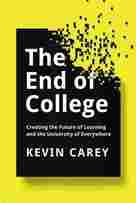
Disruptive innovation is coming to higher education and this book provides the roadmap. Much of the technology is currently in place and many students are beginning to take advantage. But, the full implementation of what Kevin Carey calls the University of Everywhere will take time.
Imagine being able to learn what you want, when you want at virtually no cost. Imagine getting a quality education without having to go thousands or hundreds of thousands of dollars in debt.
That is what the University of Everywhere will entail. No, this isn't just cheer leading for massive open online courses (MOOCs) though they will have a part to play.
No, this is about freeing knowledge and access to knowledge and about life long learning.
While the technology for the online portion of this is well developed one important barrier remains to be addressed which is credentialing. At this point, universities and colleges can charge expensive tuition for the officially accredited credentials that students seek. But, with platforms like Mozilla's Open Badges, this too will change. At some point in the not too distant future, you will be able to learn and document your learning easily and with little financial commitment. And, you will own both your learning and the documented evidence of it. Just as in health care where the trend is moving towards patients owning their health data, so too in education the trend will be towards individuals owning their transcripts as opposed to universities owning them.
A common feature of industries amid disruptive innovation is denial. Predictably many are continuing to express denial that any massive changes are coming to higher education or that these changes will affect them or their institutions directly. Many colleges and universities will be slow to see these changes coming and will not adapt well to them. Others will take tentative steps toward adaptation. The question will be whether these steps will be too little too late. The precise timetable for these disruptions is impossible to predict. It could take another generation or it could happen quicker. But, one way or the other there will be disruptions. It is inevitable. Inevitable because the knowledge that universities are currently charging for is mostly available elsewhere for free. Once the credentials are also available and employers begin using them as indicators of skills and hiring based on them there will be little left for many colleges to do. The universities and colleges that survive will do so by being remarkable. They will adapt by offering services their students want and need whether these are directly related to their mission or not. They will survive by being flexible and open to experimentation. Unfortunately, the higher education system is not well equipped to be adaptive or flexible in this way. Carey has given a comprehensive argument for how change will unfold and should be regarded by colleges and universities as a call to take action now to survive and even thrive amid massive change. Will they take this opportunity or remain in denial?
0 Comments
Leave a Reply. |
KEVIN J. BROWNEPhilosopher / Educator These blog posts contain links to products on Amazon.com. As an Amazon Associate I earn from qualifying purchases.
Categories
All
Archives
April 2023
|




 RSS Feed
RSS Feed
















